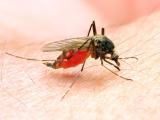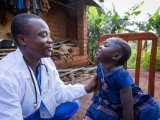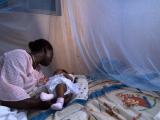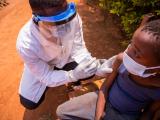Twenty years after the last cases of locally acquired malaria were reported in the United States, this summer brought reports of eight new cases of the mosquito-borne disease in Texas and Florida.
Today in Morbidity and Mortality Weekly Report, federal and state officials offer new details on these cases of locally acquired malaria reported to the Centers for Disease Control and Prevention (CDC) in May, June, and July of this year. They warn that although such infections are still rare, clinicians should consider malaria for patients who have unexplained fevers and live where the malaria parasite has been detected.
All 7 Florida cases within 4-mile radius
The first case detected this year occurred in May, when Florida officials reached out to the CDC to confirm Plasmodium vivax in a patient with no known risk factors, including no history of international travel, intravenous drug use, blood transfusion, or organ transplantation. Florida had last reported a case of locally acquired malaria in Palm Beach County in 2003.
The most recent patient was from Sarasota County, and that county and neighboring Manatee County underwent active surveillance for 8 weeks following the detection.
During that time, six other cases were detected. All seven cases occurred within a 4-mile (6.4-kilometer) radius of Sarasota County, the authors said, and an imported case of P vivax malaria (symptom onset of April 20) was previously reported in the same immediate area.
All seven cases were reported by the providers to the county health department.
"Local hospitals in Sarasota and Manatee counties were requested to begin performing malaria tests for persons meeting specific clinical criteria," the authors said. "All seven cases were reported by the providers to the county health department; providers were the first reporting source for six of the cases, and one case was detected first through syndromic surveillance."
By the last week of May, Florida officials in both counties began spraying to reduce populations of adult mosquitoes and conducting mosquito testing and surveillance.
All 8 patients reported fever, low platelets
Similarly in Texas on June 7, a patient in Cameron County with no known risk factors tested positive for P vivax. The last locally acquired malaria case had been reported in Texas in 1994. Four case-contacts also reported malaria symptoms but they either tested negative, refused malaria testing, or were lost to follow-up.
An imported case of P vivax malaria (symptom onset of May 2) was previously reported in the same area in Cameron County where the patient with autochthonous infection was likely exposed, the authors wrote. There is no evidence the cases in Florida and Texas are linked.
All patients in Florida and the single patient in Texas reported fever. Six reported chills, five reported abdominal pain, and five reported vomiting. Thrombocytopenia (low platelet count) was reported for all eight patients, and six were anemic. Seven of the eight patients were hospitalized, none developed severe malaria, and none died.
One person in Florida reported intravenous drug use, but that was deemed not a factor in contracting malaria, and three other Florida patients were homeless.
PAHO calls for more surveillance
The United States eradicated malaria in in the mid-1950s, but the Pan American Health Organization (PAHO) yesterday warned that nonendemic countries in the Americas need to step up their efforts to detect and respond to malaria. In 2022 and 2023 Argentina, the Bahamas, Jamaica, and the United States all reported locally acquired cases.
A greater effort is required in surveillance, and in keeping health personnel trained and updated.
"Given the characteristics in these (non-endemic) areas, a greater effort is required in surveillance, and in keeping health personnel trained and updated regarding the guidelines for the detection, diagnosis, and treatment of malaria cases," the PAHO analysis said.
Regular testing of the Anopheles mosquito, which carries malaria, is recommended, as is spraying for mosquito control.


















